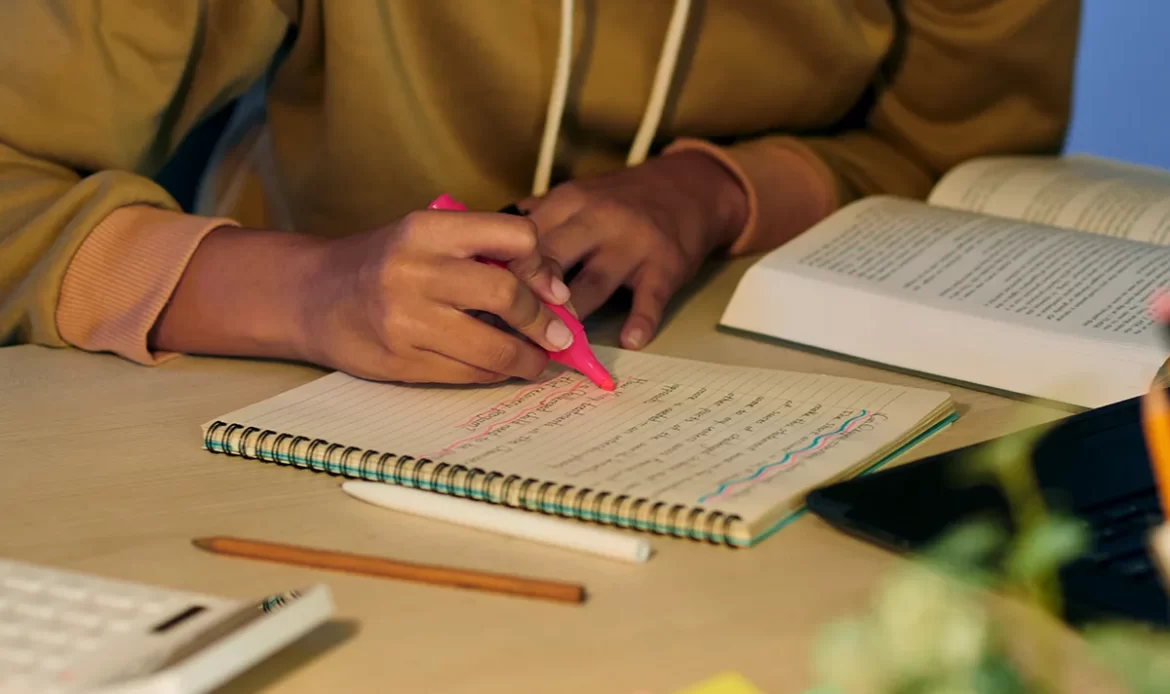
Effective study habits are necessary in our pursuit of excellence, as they are crucial to success across all levels of education. Whether preparing for exams, working on assignments, or aiming to enhance your understanding of complex concepts, adopting techniques that can make a significant difference in your learning journey is right.
While there is no ‘one-size-fits-all’ approach to studying effectively, you can use methods to improve your recall and long-term memory. Everyone has what works for them. Developing good study habits starts with small steps. Choose one or two realistic and achievable goals.
Here are our tips to help you with your studies.
1. Get Organized
Take time to get yourself organized. Follow these tips to set yourself up for success and reach your educational objectives. Firstly, consider purchasing a diary to keep track of your academic deadlines. Secondly, make sure to pack all the necessary materials and devices. Lastly, pack your bag the night before so you’re all set to go first thing in the morning.
2. Establish a Routine
The bedrock of effective studying is consistency. Set aside dedicated time slots each day for studying and stick to your schedule rigorously. Whether early morning, afternoon, or evening, find a time that works best for you and commit to it. Establishing a consistent study routine will create a habit that promotes focus, productivity, and academic success.
3. Minimize Distractions
You must study in a conducive environment, free of distractions. Picking an excellent location to study can be the first step in keeping yourself focused on your work. Choose a quiet and well-lit space where you can concentrate without interruptions.
Turn off your wifi if you use a computer and don’t need to use the internet. Doing this can help you stay focused and avoid getting distracted by the internet. It’s also important to be mindful of your phone. You can turn off notifications, keep your phone out of sight in your bag, or ask a friend to hold on to it for you to avoid checking it too often.
Studying with a friend or two, even if you are working on different material, can help you stay accountable and focused.
Read: Honey Ogundeyi is Revolutionising Africa With Edukoya
4. Break Down Study Sessions into Manageable Segments
Instead of cramming large amounts of information in one sitting, break down your study sessions into smaller, manageable segments. Use techniques like the Pomodoro Technique, where you study for a set period (e.g., 25 minutes) followed by a short break (e.g., 5 minutes). Breaking your study sessions into intervals helps prevent burnout, enhances concentration, and improves information retention.

5. Take Breaks
It has been found that taking intentional breaks can lead to better retention, increased attention, and boosts in energy. According to research, working for about 50 minutes and giving yourself a 15-20 minute break can result in optimum productivity. Here are a few ways you can take a break:
- Take a short walk
- Listen to a mood-boosting song.
- Relax with a friend
- Stretch
- Meditate
- Zone out and daydream.
- Have a snack
- Take a shower
- Clean your desk or room.
Not all study breaks are equal, as checking your phone or social media has been linked to decreased performance.
6. Practice Active Learning Techniques
To improve your learning process, active participation during study sessions is crucial. Rather than just reading or listening to course materials, engage with the content by summarizing key points, asking questions, and relating it to real-life examples. By actively engaging with the material, you’ll gain a deeper understanding and be able to retain the information for a more extended period.
7. Space Out Your Studying
Cramming for a test might help you to get a decent grade, but research suggests that you will likely forget the information as soon as the test is complete. To effectively retain the material you have learned and reduce stress during exam periods, it is essential to have consistent and well-spaced study sessions.
Instead of waiting until right before the exam to study, try reviewing the material once a week to help store it in your long-term memory. If you are preparing for an exam, spacing out your studying several weeks or months before the test date can help you remember the information in the long run.
8. Utilize Effective Note-Taking Strategies
Take organized and effective notes during lectures, readings, and study sessions. Use techniques like the Cornell or Outline Method to structure your notes and highlight key concepts. Review and revise your notes regularly to reinforce your understanding of the material and identify areas that require further clarification.
Read: 5 Top E-Learning Platforms for Nigerian and African Learners

9. Test Yourself
Retrieval practice is an excellent way of committing information to your long-term memory and quickly retrieving it when needed. Quizzing yourself or having someone else quiz you is an effective learning technique that can enhance the recall of information. Writing down the answers to the questions you ask yourself or that are asked of you can also help you commit the information to memory.
When you learn a new topic, it is helpful to create flashcards. These cards can have questions or prompts that trigger the recall of relevant information. Creating flashcards alone can help you retain information and is a practical study technique. You can ask a parent, friend, housemate, or study buddy to quiz you using your flashcards.
10. Reward Yourself
Rewarding yourself with treats, considered “bribing” yourself, has been associated with better self-control and can help you form good habits. Telling yourself that you will receive a small reward when you finish the section you want to get through or a larger reward when you have a productive day of studying can motivate you to achieve your goal.
Small rewards can be like playing a quick game, snacking on something tasty, or watching a short TV show episode. More significant rewards for a long day of studying or after completing an exam can include having your favorite meal, spending time with friends, or indulging in your favorite activity.
Incorporating these effective study habits into your daily routine can enhance your learning experience, boost your academic performance, and confidently achieve your educational goals. Remember that academic success is not just about intelligence; it’s about adopting the right strategies and habits that support your growth and development as a student. Embrace these habits, stay disciplined, and watch your academic achievements soar.
